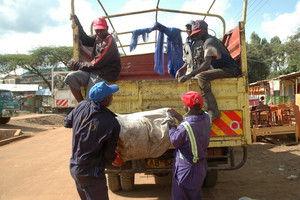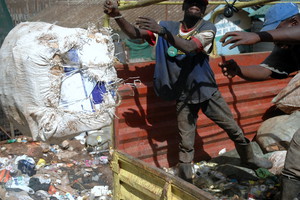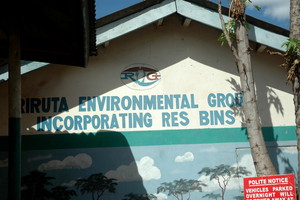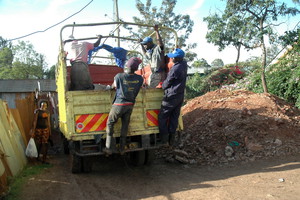Kenya: Dirt for Cash; The Inspiring Story of REG
By Eric Sande
 Nestled on a quarter acre piece of land behind makeshift buildings and local taverns in Riruta Satelite, Dagoretti South Sub county of Nairobi, is a community based organization (CBO) with a noble cause. Known as Riruta Environmental Group (REG) its core focus is job creation for young men and women of both Riruta and Kawangware slums through environmental work.
Nestled on a quarter acre piece of land behind makeshift buildings and local taverns in Riruta Satelite, Dagoretti South Sub county of Nairobi, is a community based organization (CBO) with a noble cause. Known as Riruta Environmental Group (REG) its core focus is job creation for young men and women of both Riruta and Kawangware slums through environmental work.
The membership currently stands at 250 youth though only 15 of the youth are actively involved in the project.
My arrival at the site was greeted with a beehive of acitivies.The compound was abuzz with action. Two young men were busy offloading garbage from a yellow medium sized truck and dumping the heap on aside corner of the premise. The waste was collected from the Dagoretti neighbourhoods in sacks piled together.
I met Godrey Kilei, a 33 year old man, talented footballer with a clear vision for his organization, REG. He is the assistant Chairman of the Organization. Clad in cruddy blue overall and yellow gloves, Kilei took some time off from his job to attend to me. Despite the ebbs and flows he has experienced at work, he is determined to make a change in the society.
“Don’t worry about how I look, this is the nature of our business,” Kilei said as he opened a door to his office. We sat to have the interview done.
“The idea to start REG cropped up in 1998. Then, we were an unregistered group known as Riruta Garbage Superintendents and some of us were still in school,” said the soft spoken Kilei as he composed himself to recall the genesis of the whole concept.
The Riruta Garbage Superintendents was derived from a group of young boys in Riruta satellite who were actively playing football under a football team known as, Young Satellite (YASSET). It was under the stewardship of Mr. Richard Muko who was also the brainchild behind the REG initiative its inaugural chairman.
The YASSET footballers and their cheering squad needed a sustainability project that would keep them playing and enjoying football while at the same time surviving with the growing needs of life.
At the beginning of January 1999, the Riruta superintendents started voluntary street cleanups within Riruta after seeing the need for keeping their environment clean.
Since the group was focused on environmental conservation, they found the name superintendents not fit for registration. After several meetings, in the month of June 1999, they opted to change their name to Riruta Environmental Group (REG) and officially register it as a CBO.
The aggressive and determined group embarked on garbage collection within Riruta Satellite at a subsidized fee. Their target was to serve the whole Riruta area but they had to start small. The targeted few households gradually grew from 10 to 50 and counting.
From a humble beginning, carts and wheelbarrows were the only means for transporting the garbage to the dumping sites with hopes that things would change in the future.
Other than garbage collection, part of the services rendered by the CBO was carpet cleaning. The group had no office and with the help of Fr. Kizito, founder Koinonia community, the young men were allocated an office in one of Koinonia premises in Riruta Satellite, commonly known as Motherhouse.
“Fr. Kizito’s input boosted our morale since no one was ready to share our dreams,” Kilei says.
After some few months the then chairman of the group Richard Muko with the help of other stake holders mobilized resources to have the group get some funding to sustain the project.

He introduced the organization to Sominerec a funding agency under Comboni Missionaries, formerly known as Verona fathers, who had been interested to work with the CBO.
Based on REG’s proposal to Sominerec, their funding was granted and the group was lucky to receive a quarter acre piece of land in Mutindwa in Riruta East. The land was bought with a five-bedroomed house previously owned by the Nairobi city council. The house was later renovated and converted to offices of REG. The compound was big enough to help REG in performing their job.
However, the property offer was not enough to keep the ground rolling. Sominerec intervened again, buying REG a truck to reduce the work load, improve efficiency of their services and increase their revenue since they would be in a position to reach the interior places in the Riruta neibourhood.
REG soon shifted from Motherhouse and occupied their new offices in Mutindwa.
“As a group we were still green in the business and we needed experts to help us in marketing so as to expand our services,” Kilei says.
“Garbage collection had employed about 18 youths from the YASSET football group and we employed 3 experts to help us create a market niche within Nairobi.”
The first six months brought in significant change, as the business expanded to other parts of Nairobi. The client base was overwhelming since the group had only one vehicle to serve their clients spread across the whole city.
“The service demanded more trucks to effectively deliver on our service,” says Kilei
A formal request was done to inform the donor to help the group acquire an additional truck to fill the gaps. The donor was presented with a proposal and they offered to buy the group a slightly bigger truck with a higher load capacity.
“The second truck could make more trips than the first one,” affirms Kilei.
After two years the business flourished more and it was operating at its peak. The two trucks were now insufficient to respond to the growing needs.
A third proposal to acquire a third truck was placed on the table of the donor Someneric and luckily, the request was granted.
Since the garbage collection department was operating at its economies of scale, their vehicles where always busy and on the move. The CBO’s other service for carpet cleaning was also increasing its client base within Nairobi. The group saw the need to separate the two services to effectively serve their clients.
This idea came with its own demands and to successfully distinguish the two services there was need to get a fourth vehicle which would serve the carpet cleaning department. The group had no option but to serve their donor with a fourth proposal to get them a pickup.
The CBO received the pickup and the two departments were distinct. There were no further requests done after the pickup as the group could now stand on its feet.
The group could generate an income of up to Kshs. 400,000 per month from both the garbage collection and the carpet cleaning. This significantly improved their livelihood and created more opportunities for the youths.
In late 2005 the unforeseen witch-hunting, corruption and politics started biting the group. The group lost direction and some members of REG were forced out of the services.
“I was verbally dismissed from service in 2005 and I went back to YASSET to continue with my football talent,” Kilei said lamentably.
The CBO’s services were left to a few individuals whose business was only one thing: to milk the organization dry, and leave it to the dogs.

“While I was away playing for YASSET between 2005-2007, It came to my attention that the people we left at REG offices had made away with some of the vehicles while at the same time grounded others,” Kilei said in a somber mood.
“It’s only the pickup for carpet cleaning services that was salvaged by the donor,” he said.
In late 2007, the unexpected happened. REG services were grounded. The ever busy and noisy work environment suddenly became as quiet as the grave. A small bush started cropping up in the compound. Sad reality dawn that there was no business as everything was paralyzed.
The unscrupulous employees brought the CBO to its knees. This drew the attention of the founding members who were deeply disturbed by the unfolding events. They demanded for answers of the happenings but they were not forthcoming.
In July 2008 the group consulted with the local leaders and resorted to legal action. They were then mandated by the office of the District Officer (DO) and the Social Development Officer (SDO) thorough a warrant to go reclaim and occupy what belonged to them.
There was drama as the REG members led by the area Chief, Riruta police boss, and heavily armed security officers, stormed into the REG offices. They immediately evacuated the rogue employees who were still enjoying the comfort of the offices.
After a few weeks the dust cooled and REG as a CBO took over their property and resumed their services from its death bed.
By then there were no vehicles to facilitate the services but the group resorted to the manual process of using carts and wheelbarrows.
As the situation was still mucky, some members bowed out of the business. Some lost interest while others were still struggling with trust issues. Some members had by then ventured into other businesses while others employed elsewhere.
“The remaining members volunteered to revive the project with no capital,” said Kilei.
With a lot of sacrifice, the group devoted themselves to have the project up its feet despite the many challenges they endured.
“We have done about 10 proposals since then, but none has been fruitful.We really need funds to re-equip the office.”
With the small income they were making, the group saved to purchase a vehicle. In 2013 they managed to secure an old truck to bring back their hope. Unfortunately, it did not take long before it broke down due to mechanical problems and has remained grounded since then.
“The truck requires Kshs. 60,000 for repair but we can’t afford it,” said Kilei.
This situation forced then back to the traditional use of cart and wheelbarrow system. They also had plans of renting trucks for their use.
“With the little we get we have something to carry home, although little but significant.”
REG’s daily program begins at 5.45 a.m. and has no specific closing hour from Monday to Saturday. It all depends on the weather.
“During rainy sessions the garbage weights double, and the more we reduce the weight the more trips we make using our carts and wheelbarrows save for the time we hire trucks.”
“If our vehicles were in good condition we could have saved 30% of the expenditure we incur on transport and also increase our clientele.”
When asked about the close proximity of the heap of garbage in their compound vis-à-vis the surrounding neighborhood, Kilei said they are working in cohorts with the local government to ensure the garbage does not stay in the compound more than a week.

“The county council ferries the waste to the main dumping site in Dandora every Friday to avoid any looming health hazards.”
Kilei also mentioned the fact that neighbours had previously complained about the smell, flies and rats emanating from the dumpsite. He said that they had to find a way to cure their waste and the problem was solved. He was quick to mention that now the neighbours support their cause and are happy with their services.
“In my team there are two former street boys that I rescued and gave them a job to keep them busy away from drugs and live a decent life.”
“Teamwork and discipline is our only motivation, whatever little we get we share among ourselves,” he concluded.
In addition to the income generation and environmental cleaning activities, REG is also a centre for continuous human formation. Weekly human formation programs geared towards enlightening members on Christian and other human values are carried out throughout the year. During these human formation programs, professionals in different fields are invited every week to give talks on various issues including Christian formation, HIV/AIDS, reproductive health, drug and alcohol abuse, leadership and entrepreneurship.
REG plans to support a number of its members in formal learning institutions to enhance their skills in business administration, market, customer care, research and secretarial duties. Since formation, REG has gained considerable experience in solid waste management.



